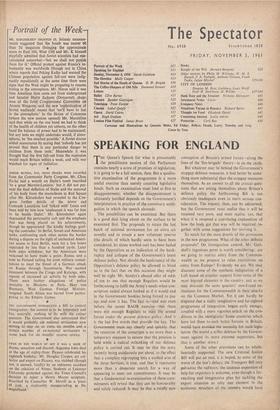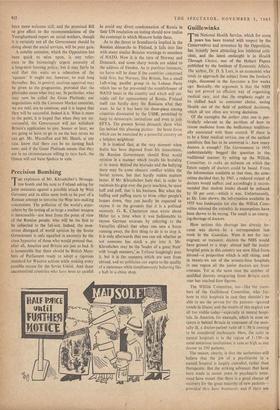SPEAKING FOR ENGLAND
HE Queen's Speech for what is presumably
the penultimate session of this Parliament contains nearly a score of promises of legislation; it is going to be a full session, then. But a qualita- tive examination of the programme is a more useful exercise than merely counting legislative heads. Such an examination must lead at first to disappointment; whether the disappointment is ultimately justified depends on the Government's interpretation in practice of the customary ambi- guities in which the speech abounds.
The possibilities can be examined. But there is a good deal lying about on the surface to be examined first. The proposals to retain the last batch of national servicemen for an extra six months and to create a new volunteer reserve (the details of which hardly seem to have been considered, let alone worked out) has, been hailed by the Opposition as an indication of the bank- ruptcy and collapse of the Government's latest defence policy. Nor should the bankruptcy of the Opposition's defence policy be allowed to blind us to the fact that on this occasion they might well be right. Mr. Sandys's absurd offer of odds of ten to one that enough Regulars would be forthcoming to fulfil the Army's needs when con- scription ended always looked as if it would end in the Government bookies being forced to pay up. and now it has. The fact is—and was even before the recent BAOR exercise----that there were not enough Regulars to man the armed forces under the present defence policy. And it is the last five words that provide the key. The Government must say clearly and quickly that the retention of the conscripts is no more than a temporary measure to ensure that the position is held while a radical rethinking of our defence policy is carried out. It may be that the story recently being assiduously put about, to the effect that a complete regrouping into a unified arm of the three Services, is true, and that it represents more than a desperate search for a way of appearing to meet our commitments. It may be that a fundamental re-examination of those com- mitments will reveal that they can be honourably and safely reduced. It may be that a totally new
conception of Britain's armed torces—along the lines of the 'fire-brigade' theory--is on the cards.
But whatever may lie behind the Government's stopgap defence measures, it had better be some- thing more substantial than the stopgap measures themselves. As an answer to all the critical ques- tions that are asking themselves about Britain's defence policy the forthcoming Bill is too obviously inadequate even to merit serious con- sideration. The inquest, then, can be adjourned; but the Government must realise that it will be resumed very soon, and must realise. too, that when it is resumed a convincing explanation of how the body got that way will be required, to- gether with some suggestions for reviving it.
So much for the most drastic of the provisions in the new programme. What of the other definite proposals? On immigration control, Mr. Gait- skell's ingenious point is worth considering: are we going to restrict entry from the Common- wealth as we prepare to relax restrictions on entry from Europe? Evidently we are. We may discount some of the synthetic indignation of a Left based on popular support from some of the most bigoted elements in the country, just as we may discount the same quarters' new-found en- thusiasm for the Commonwealth in their attacks on the Common Market. Yet it can hardly be disputed that a really imaginative and far-sighted programme of integration, begun early enough, coupled with a more vigorous attack on the con- ditions in the immigrants' home countries which have led them to seek better fortune in Britain, would have avoided the necessity for such legis- lation. (So would a stiffer defence by the Govern- ment against its more extreme supporters, but that is another story.) Some of the other provisions can be whole- heartedly supported. The new Criminal Justice Bill will put an end, it is hoped, to some of the worst of the law's delays; the Transport Bill may galvanise the railways; the cautious expansion of help for exporters is welcome, even though a far- reaching and imaginative plan for tackling the export situation as only one element in the economic structure of the country would have been more welcome still; and the promised Bill to give effect to the recommendations of the Younghusband report on social workers, though it is certainly not all the Government should be doing about the social services, will be pure gain.
A notable omission, which the Opposition has been quick to seize upon, is any refer- ence to the increasingly urgent necessity of a long-term housing policy; but it may fairly be said that this waits on a relaxation of the `squeeze.' It ought not, however, to wait long thereafter. But, in general, cautious approval may be given to the programme, provided that the platitudes mean what they say. In particular, what may now be called the Great Platitude; our negotiations with the Common Market countries, we are told, are to continue, and it is hoped that they will be successful. Indeed it is. What is more to the point, it is hoped that when they are un- successful, the Government will not withdraw Britain's application to join. Sooner or later, we are going to have to go in on the best terms we can get. Mr. Macmillan and Mr. Heath, at any rate, know that there can be no turning back now; and if the Great Platitude means that they are in no circumstances willing to turn back, the Queen will not have Spoken in vain.















































 Previous page
Previous page